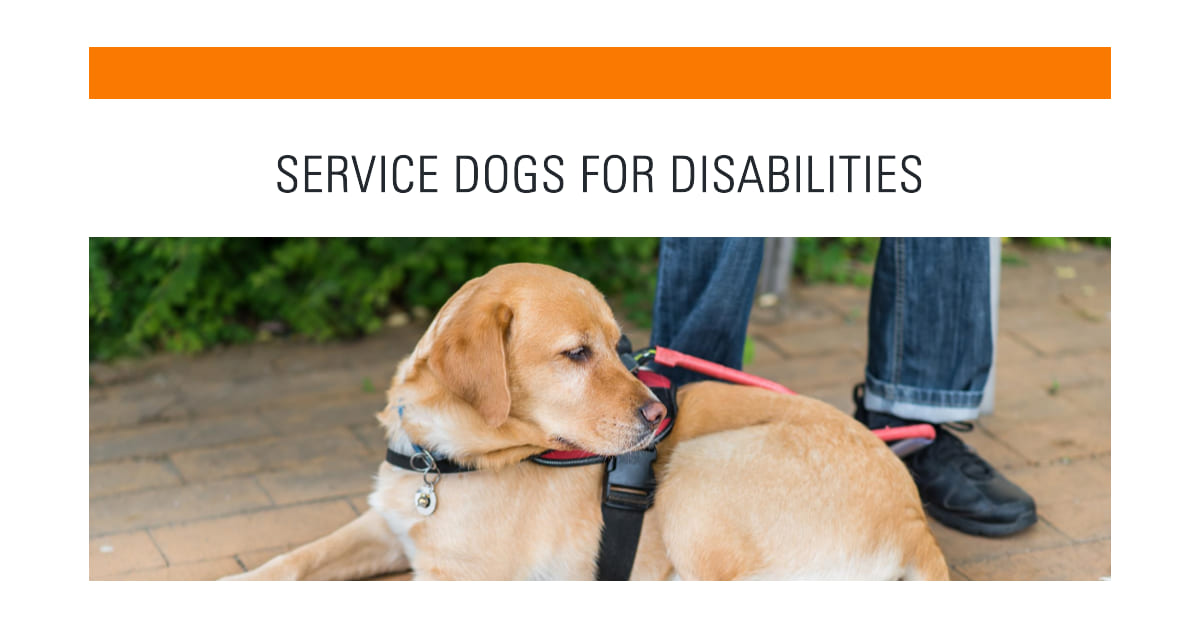Service dogs play a crucial role in transforming the lives of individuals with disabilities. These remarkable animals are extensively trained to perform specific tasks that mitigate the challenges faced by people with disabilities.
When it comes to qualifying for a service dog, there is a wide range of disabilities that can benefit from their assistance. In this comprehensive blog post, we will delve into the different types of disabilities that typically qualify for a service dog and explore the incredible benefits these compassionate companions provide.
Table of Contents
ToggleUnderstanding Service Dogs
Service dogs are not your typical household pets; they are highly trained animals that provide invaluable assistance to individuals with disabilities. These dogs undergo rigorous training programs to acquire the skills necessary to help their handlers navigate daily life tasks. Unlike emotional support animals or therapy dogs, service dogs are specifically trained to perform tasks directly related to their handlers’ disabilities.
Types of Disabilities That Qualify for Service Dogs
Physical Disabilities: People with physical disabilities such as limited mobility, limb loss, or paralysis often require assistance with various tasks. Service dogs can be trained to retrieve objects, open doors, turn on lights, and even provide support for balance and stability. These dogs can significantly enhance the independence and mobility of their handlers, allowing them to navigate their environment with greater ease.
Visual Impairments: Individuals who are blind or have visual impairments can greatly benefit from guide dogs. These highly trained canines act as their handlers’ eyes, guiding them safely through their surroundings. Guide dogs are trained to navigate obstacles, stop at curbs, and locate specific destinations, enabling individuals with visual impairments to move around confidently and independently.
Hearing Loss: People who are deaf or hard of hearing can rely on hearing dogs to alert them to important sounds. These specially trained dogs can signal their handlers when the doorbell rings, a phone rings, or an alarm goes off. They can also assist in retrieving objects and provide companionship to individuals with hearing loss, enhancing their safety and communication.
Psychiatric Disabilities: Service dogs can provide immense support to individuals with psychiatric disabilities such as post-traumatic stress disorder (PTSD), anxiety disorders, or depression. These dogs are trained to perform tasks like providing deep pressure therapy, interrupting harmful behaviors, creating personal space in crowded areas, and providing emotional support during stressful situations. They offer a comforting and grounding presence for their handlers, reducing anxiety and improving overall mental well-being.
Autism Spectrum Disorders: Service dogs can be of great assistance to individuals with autism spectrum disorders. These dogs are trained to provide a calming presence, help prevent wandering or elopement, and assist with sensory overload situations. They can also help promote social interactions and improve communication skills, making everyday life more manageable for individuals on the autism spectrum.
Medical Conditions: Certain medical conditions, such as epilepsy or diabetes, can also qualify individuals for a service dog. These dogs are trained to detect seizures, alert their handlers or caregivers, and provide support during an episode. In the case of diabetes, service dogs can detect changes in blood sugar levels and notify their handlers, allowing for timely intervention.
The Benefits of Service Dogs
Service dogs offer a multitude of benefits to individuals with disabilities:
Increased Independence: Service dogs enable individuals with disabilities to carry out tasks independently, enhancing their overall quality of life and reducing reliance on others.
Emotional Support: These incredible animals provide companionship, emotional support, and unconditional love to their handlers, helping to alleviate feelings of isolation and loneliness. They become constant sources of comfort and security.
Improved Safety: Service dogs can detect and respond to potential dangers, such as seizures, allergic reactions, or hazardous situations, ensuring the well-being of their handlers. Their vigilant presence offers a sense of security and peace of mind.
Enhanced Social Interactions: Service dogs often act as a bridge, facilitating social interactions and breaking down barriers for individuals with disabilities. They can help initiate conversations and promote positive engagement with others.
Relevant Faqs about Disabilities and Service dogs
Here are some relevant FAQs about disabilities and service dogs:
1. What is a service dog?
A service dog is a highly trained animal that assists individuals with disabilities by performing specific tasks related to their disability. These dogs are trained to provide practical assistance and support to their handlers.
2. What disabilities qualify for a service dog?
Various disabilities can qualify for a service dog, including physical disabilities, visual impairments, hearing loss, psychiatric disabilities, autism spectrum disorders, and certain medical conditions like epilepsy or diabetes.
3. How do service dogs assist individuals with physical disabilities?
Service dogs can assist individuals with physical disabilities by retrieving objects, opening doors, turning on lights, providing support for balance and stability, and even performing tasks specific to the individual’s needs.
4. How do service dogs assist individuals with visual impairments?
Guide dogs are trained to assist individuals with visual impairments by navigating obstacles, stopping at curbs, and helping their handlers safely navigate their environment.
5. How do service dogs assist individuals with hearing loss?
Hearing dogs can alert individuals with hearing loss to important sounds such as doorbells, phones ringing, or alarms going off. They can also assist in retrieving objects and provide companionship to individuals with hearing loss.
6. How do service dogs assist individuals with psychiatric disabilities?
Service dogs can provide support to individuals with psychiatric disabilities by performing tasks such as deep pressure therapy, interrupting harmful behaviors, creating personal space in crowded areas, and providing emotional support during stressful situations.
7. How do service dogs assist individuals with autism spectrum disorders?
Service dogs can assist individuals with autism spectrum disorders by providing a calming presence, helping to prevent wandering or elopement, and assisting with sensory overload situations. They can also aid in promoting social interactions and improving communication skills.
8. How do service dogs benefit individuals with disabilities?
Service dogs offer numerous benefits, including increased independence, emotional support, improved safety, and enhanced social interactions. They help individuals with disabilities carry out tasks, provide companionship, detect potential dangers, and facilitate engagement with others.
9. How can I obtain a service dog for my disability?
Obtaining a service dog typically involves contacting accredited organizations that specialize in training and placing service dogs. These organizations can guide you through the application process and provide assistance in finding a suitable service dog for your specific disability.
10. Are service dogs protected by laws?
Yes, service dogs are protected by laws such as the Americans with Disabilities Act (ADA) in the United States. These laws grant individuals with disabilities the right to be accompanied by their service dogs in public places and provide legal protection against discrimination.
Remember, it is important to consult with professionals and accredited organizations for specific information and guidance regarding service dogs and their suitability for your particular disability.
Conclusion
Service dogs have an extraordinary impact on the lives of individuals with disabilities. Whether it’s physical, visual, hearing, psychiatric, or medical disabilities, these specially trained animals provide crucial assistance and support.
From enhancing independence and safety to offering emotional comfort and facilitating social interactions, service dogs are true companions and heroes.
The bond between a service dog and its handler is built on trust, understanding, and unwavering loyalty.
Let us continue to celebrate and support these incredible animals, ensuring that more individuals with disabilities can experience the life-changing benefits they bring.































